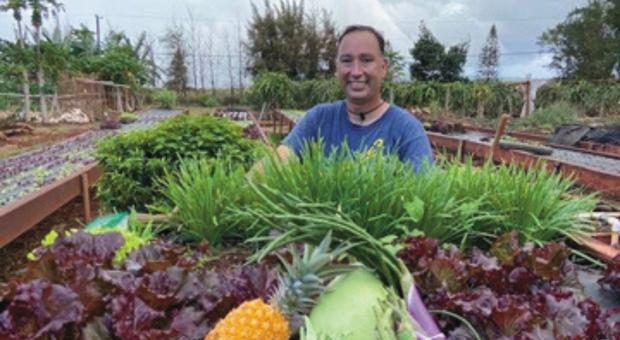15
Mar
Maui County, Hawai’i Leads Nation in Supporting Transition to Organic Agriculture with New Law

(Beyond Pesticides, March 15, 2023) In a move that will improve land access for Mauiʻs organic farmers, Maui County Council passed Bill 160 (Kula Agricultural Park Phase I Expansion Area), reserving 262 acres in the Kula Agricultural Park for practices that comply with the Organic Foods Production Act and USDA organic standards, and removing barriers in the application process in favor of emerging farmers.
Councilmember Gabe Johnson, chair of the Agriculture, Diversification, Environment and Public Transportation Committee, sponsored the bill. “Regenerative agriculture is a forward-thinking system that works to nurture soil, protect water resources and biodiversity, and combat climate change,” said Mr. Johnson. “We need to create an environment that supports our farmers and agriculture economy.”
Maui County currently has an operational 445 acre Agriculture Park, available for lease at the affordable rate of $100 per acre per month. All users of the current Agriculture Park practice chemical-intensive methods, making it an unsuitable area for organic farmers. In 2018, Maui County purchased an additional 262 acres to expand the Agriculture Park, and Bill 160 reserves the expansion area for organic practices, giving organic farmers the same opportunity for affordable land access. The Kula Agriculture Park expansion will be available for lease after the county completes the planning and infrastructure phase.
Maui County imports about 85% of its food, leaving the population vulnerable in times of disaster or supply chain disruption, and making the cost of food high. Maui County and the State of Hawaiʻi are taking action to change that, and increase the amount of food produced locally, and environmental advocates have been pushing to define what kind of agriculture they would like to see as a solution.
Autumn Ness, director of Beyond Pesticides Organic Land Management and Farm Support Program, worked on Bill 160 with Mr. Johnson and says, “Not all agriculture is good agriculture, and as we seek to increase agriculture and food security, that cannot come with increased petrochemical pesticide and fertilizer use, at the cost of our health and environment.” She continues: “We can increase food production, remediate our soils, keep our near shore waters clean, conserve our precious water resources, and keep our residents healthy, all at once. Organic agriculture does that.”
Family Farmer Training Networkʻs Georgia Pinsky supported Bill 160. Ms. Pinsky said, “I work with beginning farmers who are motivated to grow food and steward the land, but one of the biggest barriers to their success is access to affordable land. Bill 160 is a game changer for them.”
Ms. Ness challenges the notion that “no one wants to be a farmer these days,” saying that: “The conventional commodity crop agriculture model isnʻt attractive to many young Maui farmers. Thatʻs what the system has been set up to support, and people who want to farm to organic standards have trouble navigating outside of that.”
There are three farmer training programs on Maui, with full cohorts every year; Go Farm, through the University of Hawaiʻi, Farmers Apprentice Mentorship Program through the Hawaiʻi Farmers Union, and The Family Farmer Training Network. Representatives from each program report that almost 100% of the graduates want to practice organic or regenerative farming.
“We, as a community, have to build systems that support their success,” says Mr. Johnson. “Our future depends on them.”
Bill 160 comes on the heels of multiple actions that are intended to work together to create an environment that supports and prioritizes regenerative organic farming and land management.
In 2020, Maui County Council funded an agricultural microgrant program, which is now in its third year of funding. Applicants are eligible for up to $25,000 in grants for expenses that will help them increase food production. Preference is given to Native Hawaiian, women, and farmers of color.
In 2020, in the midst of COVID shutdowns, Beyond Pesticides co-founded Maui Hub, to support Mauiʻs local farmers through the crisis, with a long-term goal to build a dependable market that will facilitate the large-scale increase in local, organic food production. It is in its third year, and still growing.
In 2021, Maui County passed the strongest public lands organic policy in the country, prohibiting the use of all synthetic pesticides and fertilizers on any county-owned lands, including parks and roadways.
“Itʻs exciting to see our community begin to prioritize organic agriculture as the solution to so many crises we face,” says Ms. Ness. She continued: “We are still in the beginning stages of evening the scales in a system that has favored conventional and plantation agriculture for over 100 years. We have a long way to go, but we are committed to making regenerative, traditional Hawaiian, and organic agriculture the norm on Maui, becoming an economic driver that has positive benefits for generations.”
Visit Maui County Council’s website at https://tinyurl.com/Bill160CD1FD1 to read Bill 160. For more information about Beyond Pesticidesʻ work in Hawaiʻi, please contact: [email protected].
Photo: Maui County Council Member Gabe Johnson on his organic farm. Mr. Johnson was an organic farmer prior to being elected to represent the island of Lānaʻi on the Council.










